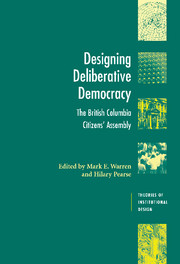Book contents
- Frontmatter
- Contents
- List of Tables
- List of Figures
- Contributors
- Preface
- Introduction: democratic renewal and deliberative democracy
- 1 Who should govern who governs? The role of citizens in reforming the electoral system
- 2 Citizen representatives
- 3 Institutional design and citizen deliberation
- 4 Agenda-setting in deliberative forums: expert influence and citizen autonomy in the British Columbia Citizens' Assembly
- 5 Descriptive representation in the British Columbia Citizens' Assembly
- 6 Do citizens' assemblies make reasoned choices?
- 7 Communicative rationality in the Citizens' Assembly and referendum processes
- 8 Deliberation, information, and trust: the British Columbia Citizens' Assembly as agenda setter
- Conclusion: the Citizens' Assembly model
- References
- Index
2 - Citizen representatives
Published online by Cambridge University Press: 22 September 2009
- Frontmatter
- Contents
- List of Tables
- List of Figures
- Contributors
- Preface
- Introduction: democratic renewal and deliberative democracy
- 1 Who should govern who governs? The role of citizens in reforming the electoral system
- 2 Citizen representatives
- 3 Institutional design and citizen deliberation
- 4 Agenda-setting in deliberative forums: expert influence and citizen autonomy in the British Columbia Citizens' Assembly
- 5 Descriptive representation in the British Columbia Citizens' Assembly
- 6 Do citizens' assemblies make reasoned choices?
- 7 Communicative rationality in the Citizens' Assembly and referendum processes
- 8 Deliberation, information, and trust: the British Columbia Citizens' Assembly as agenda setter
- Conclusion: the Citizens' Assembly model
- References
- Index
Summary
Democratic theorists commonly distinguish between direct democracy and representative democracy. In a direct democracy, citizens rule themselves, while in a representative democracy they elect representatives to rule on their behalf. Today's democracies are all representative in structure – a form dictated by scale and complexity – with some direct elements such as initiatives and referenda, as well as some forms of citizen engagement. The concept of participatory democracy usually refers to these latter two elements: direct decision-making as well as citizen involvement in decision-making within representative structures. If, however, we consider these two forms of participation from the perspective of representation, the first involves citizen participation in government or other formalized decision-making, on the assumption that citizens represent themselves within these processes. The second involves citizens themselves serving in representative capacities: lay citizens represent other citizens. I shall refer to these roles as citizen representatives – a form of representation that is increasingly common in practice, but almost untheorized in democratic theory.
To be sure, the idea that citizens are best represented by other lay citizens serving as representatives is an old democratic ideal. It justified early notions that elected representatives should be salaried so as to enable ordinary citizens – not just the rich – to serve in public office, as well as the more recent idea that term limits will prevent elected representatives from becoming professional political elites.
- Type
- Chapter
- Information
- Designing Deliberative DemocracyThe British Columbia Citizens' Assembly, pp. 50 - 69Publisher: Cambridge University PressPrint publication year: 2008
- 62
- Cited by



